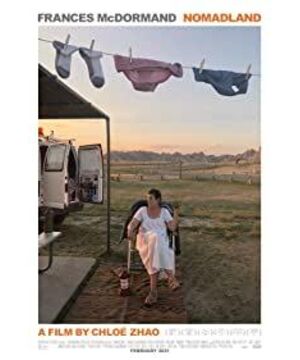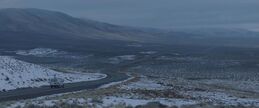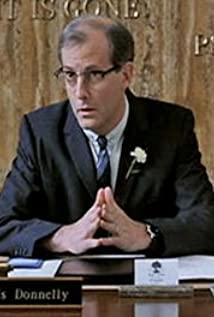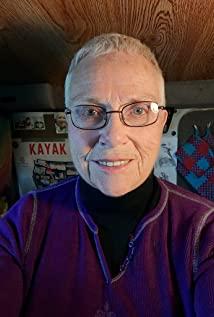After reading Zhao Ting's "A Place of Nowhere", the first thing I thought of was Su Shi's words: Sending a mayfly in the sky, a drop in the ocean. This work that shined at last year's Venice Film Festival, with the ability to moisturize things and silent images, bursts out the emotional power that merges China and the West, and traverses the past and the present.
However, although the golden lion's halo has been praised by a crowd of film critics, "A Place to Nowhere" is bound to confuse some viewers. If you want to find an appropriate coordinate from the films of recent years, the impression it triggers may be similar to Terrence Malick’s "The Tree of Life": this is not a plot-driven drama, nor is it one. A purely documentary film, you can even think that the film "A Place Without a Dependence" has no "plot", but only "emotion".
This may be even more confusing to say, so you might as well ask yourself: What are the "plots" in your life that are worthy of a book? ——It is estimated that many people will frown and become confused in an instant. But the entangled in the heart's endless, endless and fleeting emotions: even if it is indescribable and unspeakable, this hidden "path of the mind" is always clear to you-the real life is just like so.
The film "A Place to Nowhere" attempts to question the ever-changing life itself through the tossing and tossing personal life. The beautiful pictures, the texture of literary films, the encounter between man and nature, the reincarnation and transcendence of life...The broad and vast thinking is the similarity between "A Place without a Dependence" and "The Tree of Life" , But it is not like the latter cyclically in different time and space. Following the subjective perspective of Coen's wife who is aimless and easy-going, what we embark on is a one-way journey that cannot be turned around—just like a life without going back.
Although it is analogous to "The Tree of Life", please rest assured: The "unexplainable" of "A Place to Nowhere" is by no means the threshold for viewing the movie, and it is not a self-talking, showing the protagonist's private Experience the movie. Although you want to understand it better, you need some homework assistance: for example, familiar with its original novels, American nomadic culture, the historical background of the Great Depression, and the previous works and resumes of Director Zhao Ting...
But believe me, even if you don’t know anything about all of these things, as long as you can simply devote yourself to appreciation, you can slowly blend into the world that the movie wants to lead you into. The fact may be the opposite: In terms of the need for knowledge to understand the film, "Nowhere" is even "easier" than the self-contained Marvel series.
The reason is that in the contemporary film industry that regards drama and entertainment as its supreme purpose, "A Place to Nowhere" is a "retro" movie that goes the other way: loose and fragmented plot, peaceful and peaceful atmosphere, distant and quiet The philosophies are "transcendental", just like the works of Antonioni and Angelopoulos in the last century.
So as long as you are willing to open your heart, regardless of previous movie-watching experience (especially Hollywood commercial movies), you can also intuitively feel what you think and think every second, and a new, familiar, strangeness is born in your heart. And cordial and complex feelings.
"Transcendentalism" in philosophy advocates that people can transcend sense and reason to reach the truth directly, emphasizing the unity of human intuition and human beings with everything. Emerson believed that people should "believe in yourself" because the entire human world is a microcosm of the universe. "A Place of Nowhere" is just such a "transcendentalist" prose poem about "believe in yourself".
Faced with such a long lyrical poem that "the shape is scattered and the spirit is not scattered", I didn't want to use the form of a subtitle to separate the "integrity" of its abstract image and concrete narrative: its thinking content is so majestic, and the lens implies this. The rich and hidden information is so subtle, it really has reached the realm of harmony between water and milk, and the unity of nature and man. No wonder it can be softened by winning prizes all over the world.
However, the following texts are reining in and do what I want. I still follow the time of the film and draw three subtitles in turn, and cut into the most important expressions of the film in three aspects-"What is home", "Survival in the Wilderness" and "On the Road". Well, since some movies have been listed earlier, these three subtitles might as well adopt movie names.
[Why home?]
When the sister-in-law Cohen said this sentence on the screen, it is not only the “red neck” in the rust zone who knows how to smile; today, when the gap between rich and poor in the world continues to increase, everyone can feel the same way. Even if you don’t know the background of the film (only with the opening captions) that caused the housing bubble to burst and the demand for gypsum board in the 2008 U.S. subprime mortgage crisis, have you not seen the "American Factory" a year ago? Are you not familiar with the tide of layoffs in the Northeast at the end of the last century? Don't you know about the thunderstorms in Eggshell Apartments, "Clear DD Entrance", "996" and "Beat Workers"?
Mark Twain said: History will not repeat itself, but it will rhyme. Although "Nowhere" focuses on the marginalized groups in specific time and space, the reality of homelessness of "modern nomads" is quite representative and universal. It's just that not everyone has the opportunity to live in RVs and form a "bargaining" communist community.
The status quo of the nomads at home, of course, reveals criticism of the "sweatshops" represented by industrial giants such as Amazon. Director Zhao Ting has devoted deep care to the "American mobile social network" formed by RVs-this is based on Careful observations on the real and social levels. As Zhao Ting said: "This movie is full of social commentary." These dotted, point-to-stop discussions can be seen in the following screenshots of the movie:
But at the same time, the place where "A Place of Nowhere" is commendable and superior is that in an era when ideology is polarized and crowds are extremely antagonistic and torn apart, these densely populated "social discussions" are just discussions rather than words. Intense "political opinions". Just as Fern questioned the attitude of her sister's friends on real estate, she was not trying to fight against an established "economic system", but to choose a bright stand for her own life.
Therefore, under the urging of ruthless reality, we need to experience some deeper things through politics: don't forget the line in the film, "Home is just a name, or is it something you always keep in your heart?"
In fact, Fern is not really "no room to live". She can live with her sister, with friends, and her lover in secret. It is really impossible and there are free beds provided by the church, but Fern has chosen all of this. Refuse. Is this just like my sister said, "because you are braver and honest than everyone else"?
The real problem is that Fern rejects the "human alienation" in Max's words: a highly industrialized society accelerates the atomization of isolated and helpless individuals, a clock-like life, and heavy survival pressure makes people unable to be themselves. Just like the "ship of the earth" that every homeless person in the film aspires to: It is an "independent house, which does not produce garbage, does not pollute the environment, and is completely self-sufficient. It will exist for a long time, longer than human existence. It's a long time"-this is a betrayal of the capitalist way of life, and it is also a utopia that has never been seen in reality. In essence, the criticism of "Why Home" in "A Place of Nowhere" does not resemble realistic themes such as "Dust and Fog Home". The "home" of "Why Home" refers to a spiritual home rather than an actual family.
Compared with the "metaphysical" house that always exists in the ideal, the riddled reality can only provide "the same" house.
Just as at the end of the film, Fern returned to his long-lost home: Where will the memory be placed when people go to the empty house? ——Can only continue to follow oneself like a shadow. If so, why bother? So a few seconds of hesitation was completely relieved: she turned her head resolutely and plunged into the wilderness.
Just like 1900, who saw thousands of roads but "nothing to see", in the eyes of Fern, who had gone through tribulations and read thousands of sails: The tangible house has long since become insignificant or even no longer exists. This world may really resemble the line in "Elephant Sitting on the Ground": It's a wasteland.
[Survival in the Wilderness]
Unlike Christopher, who took the initiative to walk into the mountains and forests in "Wilderness Survival", Fern and other "Wanderers" were undoubtedly "forced" to go on the road at the beginning, but they have the same determined life beliefs and unwavering self-awareness. .
One of the most interesting details in the film is that when Fern couldn't stand Linda May's persuasion and made up his mind to reach the wasteland, the temporary community of nomads, the first ray of sunshine finally appeared in the film.
The photographer Richards of the film "A Place without a Back" is Zhao Ting's boyfriend. He has participated in all of Zhao Ting's previous works. This time the two once again joined hands to discover the breathtaking beauty in the wilds of the Midwestern United States: Richards likes to shoot the horizon with a long lens, most of which are done in "magic time".
The so-called "magic time" is a photographic term: when the sun is about to rise or set. If you take a picture during this period, everything will be covered with a layer of golden light, and you can capture a dreamlike picture.
Starting from the 22nd minute of the film, following the footsteps of the newcomer Fern, Zhao Ting took two minutes to show us the whole picture of the nomad tribe with a long moving shot of "walking through the new home": this is the Midwestern United States. The "ordinary world" is the "medieval life" that Internet people can't imagine.
The dilapidated RV that patrols day and night, like a lonely boat that no one cares about, can only be parked here for a short period of time to find a warm harbor. Under the extremely beautiful landscape composition, the hardships of survival and the pains of forbearance are extremely real: the homeless "godfather" Bob, who built the nomad website with one hand, provides a share for thousands of desperate people. "Wandering Raiders", the reason why he does everything he can to help people who have never met is to heal the inner pain of his son's suicide.
And some young people simply live as modern "Gypsies": they ran away from home, yearning for the aura of "dream catchers," but their destitute and desperate future could hardly conceal the sadness of the loss of love.
There are also elderly people who are more than ancient times, knowing that they are terminally ill and there is not much time, still driving the only truck to the holy place in the heart of dreams...
The film is not eager to reveal Fern's own experience, but focuses on her relationship with other nomads. With the exception of Coen's wife and a few actors, all the nomads in "A Place of Nowhere" are non-professional actors-in other words, they are playing exactly themselves.
Zhao Ting consciously asked the nomads to explain their attitude towards life through real dialogues. Like the sister-in-law Coen who connects all the characters, we entered the real and mysterious group of "Nomad" from the perspective of a bystander. Unconsciously, we changed from our usual empathy for the stories of others to a "contemplation" of mutual respect and equal treatment with the "character". As Zhao Ting said: "Let it flow, as if you are just participating in their existence."
In the vast expanse of land, this kind of simple connection between people, which seems to exist or not, does not disturb each other, shines with moving humanity. A particularly prominent scene is the friendship between Coen's wife and Swankey: Fern listens to her reminiscences of the past and imagines the end of life. With the moving music composed by the Italian pianist Ai Audie, we might as well relive that touching and twilight monologue of life:
"I'm 75 years old this year. I think my life has been pretty good. I have seen many beautiful things when kayaking around: I saw a family of elk on the Idaho River; in Colorado On the lake, a huge white pelican landed in front of my kayak; after crossing a corner, there was a cliff. I saw hundreds of swallows parked on it, and swallows were flying in the air because of the river’s Reflected, it looks like I’m flying too. There are also newly hatched young swallows, small eggshells falling from the cliff to the surface of the water floating, those white eggshells are simply wonderful, I think I have experienced enough More, my life is complete. If I die at that moment, there is no problem at all for me."
This is not the poetic and artistic meaning of touching the scene, nor is it talking about the harmonious coexistence of man and nature. Words such as "poetry" and "distance" appear so frivolous at this moment. I think this is Zhuang Zhou's "Heaven and earth live side by side with me, and everything is one with me". This is Tao Yuanming's "In the big waves, neither happy nor afraid." Perhaps it is only when life reaches the end and transcends life. become possible.
Many of the long-term shots in the movie "A Place to Nowhere" wander around the vast deserts and vast plains of Nebraska, South Dakota, Nevada and Arizona. In contrast, people are so small, like a tiny grain of sand in the torrent of the times.
But at the same time, small people are so powerful because of their beliefs and souls: the contrast between vastness and humbleness, ethereal and reckless life, fully reflects the loneliness of silence and aphasia. Qingqingling tombs and cypresses, Leilei River in the stone; between the world of life, suddenly like a traveler. Director Zhao Ting said: "When you have witnessed the lives of those people with your own eyes, it is more about the fleetingness of life, becoming part of the natural ebb and flow."
There is you in the gathering, and me in the gathering; the rebellious journey of all things, the passerby of a hundred generations. After seeing through, that's it. Even if you encounter the heaviest life crit, facing a life that looks like a white horse, it is better to regroup and continue to set off: to achieve the most complete freedom and complete the ultimate transcendence.
【on the way】
Although I have walked the valley of the shadow of death, I am not afraid of being harmed, because you are with me. --"Bible"
The puzzle that was quietly left for the audience at the beginning of the film slowly revealed the truth in the following days of carelessness and floating: there is no self-exile for no reason, but it is inseparable from the depths of the soul.
Unforgettable love is like a ring in the hand, endlessly traveling back and forth. Everyone who has gone through life and death has inner scars that he does not want to lift easily, and even forgetting seems to be a betrayal to the deceased.
Everyone should have noticed such a detail: When Dave accidentally smashed the plate his father had left Fern, the angry Fern first thought about re-sticking the plate.
But life cannot be "reconstructed", but is often "overwhelmed with water." This explains why the determined Fern has remained unmoved in the face of Dave's courtship.
Because if Fern accepts this new relationship, then the new memory will dilute the old time between her and her husband, and over time, the fuzzy husband will really disappear completely from this world.
Speaking of this, I have to mention the 1984 road film, "Paris, Texas" directed by Wim Wenders. What is interesting is that "Nomadland" (literally translated as the land of tourists) is a compound term full of contradictions, as is "Paris in Texas".
Similar to Fern, Travis (meaning traveler) in the movie "Paris, Texas" is also a person who is obsessed with the past, and others can't keep it: whether it is the fetters of family or the warmth of the family, Can't stop these two men from resolutely hitting the road without hesitation. But there is one difference: Travis has only lost love, and his lover is at least alive; while Fern has lost his father and husband one after another.
Fern's wanderings are not like Travis for the purpose of self-salvation. She did not continue to escape for the rest of her life, but looked forward to transcendence. Zhao Ting does not try to make us feel deeply sorry for Fern's fortune. "Pity and sympathy" is not the goal. Repeated refusal is not pretentious or hard-hearted, because people are born lonely. When the mists of life are cleared, loneliness is the only sure way to exist.
In the day and night, non-stop life journey, we have seen all kinds of landscapes and harvested friends who meet by the water, family, friendship, love...and we came and thought one after another without preparation. In the lost wind, after a sober sober experience, we suddenly discovered: everyone is just everyone, a lonely person...
The movie "A Place of Nowhere" presents the ultimate loneliness of being born as a human, dependent, and destructive. Each frame seems to contain a period of the past and the bitterness of waking up after a big wave.
What does it mean to be on the road forever? Facing Bob, Fern frankly confessed the knot that had been entangled with him. But Bob, who also experienced the pain of bereavement, finally helped her to easily resolve the confusion about life with the phrase "Never say goodbye".
Yes, life is a difficult journey, and life is a long cycle: even the parallel lines you think are, when placed on the ruler of the globe, there will eventually be a moment of intersection. Examining Baiyun Canggu’s life and dreams, observing the bitterness during the period of contemplation, and counting all the losses and persistence, we can further understand the profound meaning of "on the road": it is the continuation of life and the transcendence of death.
After Uncle Phoenix shocked the world with his wild performance of madness in the last Golden Lion Awards, Francis McDormand once again renewed our understanding with the loud sound and the invisible and invisible performance of the elephant. The cognition of the term "acting skills": With only one look and one expression, she has achieved a state that many actors can't reach with the densest lines and the strongest dramatic conflicts. She has integrated her entire acting life into this piercing role. Through the performance of "the realm of no self", we have seen the whole life.
After traversing all life experiences and understanding the ultimate mystery of life, we finally know the meaning of "always on the road". Just as we always think that the passing of an important person will bring long and great sorrow; however, it can also end all sorrows at the same time.
Flowers bloom, ebb and flow, and even the dazzling light from the bright stars will eventually go out one day. In this world and even the entire universe, the river of life is surging forward, never stopping. Death is a change and far from an end. Everything is a momentary encounter, a momentary eternity.
In the end, we will meet the beloved of this life that we will never forget.
Author | Ji Yang; Official Account | Seeing Death in Movies
Edit | Riding a Rooftop Boy; please indicate the source for reprinting
View more about Nomadland reviews











